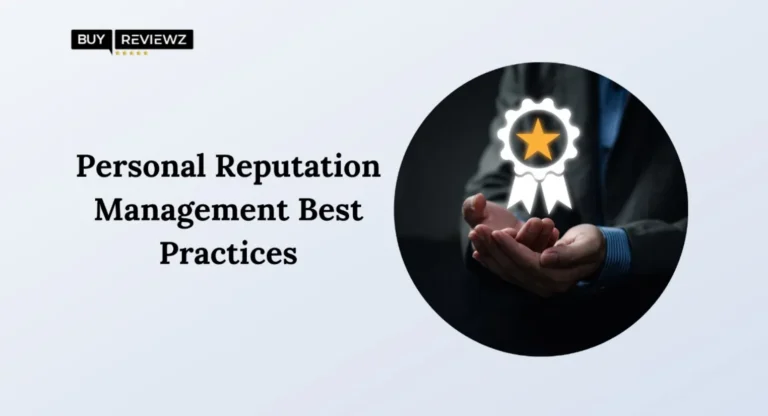What others say about you online can greatly influence your reputation in the digital era. With so many channels available for opinion sharing, reputation management has become essential.
While a poor reputation can result in failure, a good one can attract new opportunities and partnerships. Build a professional social media presence and buy Google reviews that highlight your strengths.
In this blog, we will discuss personal reputation management, its best practices, and how to put your best foot forward online.
What Is Personal Reputation Management?
Personal online reputation management (ORM) is the proactive monitoring, influencing, and control of an individual’s internet presence to create a positive impression.
To manage your personal reputation, you must have a solid online presence, which may include creating a personal website, maintaining a social media presence, obtaining earned media coverage, publishing press releases, and so on. If you are already established online, controlling your personal reputation may also entail monitoring relevant online conversations.
Best Practices To Manage Your Personal Reputation
Manage your personal reputation effectively with these best practices to prioritize privacy, showcase expertise, and engage authentically with your audience.
- Define Your Personal Brand
You must decide how you want to be perceived to create an online presence that best captures your personality. Your personal brand should be an honest and aspirational reflection of who you are, what you have accomplished, and your future goals.
Look up essential figures in your sector on Google if you need help determining where to begin. Which profiles do they possess? What do they decide to divulge? Do they own a YouTube channel or a blog?
Observing how other people in your sector present themselves may help you better define your own image and gain insight into the elements you need to include to stand out online.
- Maintain Your Social Media Profiles
Ensure that your social media professional profile is consistent, full, and search engine optimized. Use industry-specific keywords in your posts, headings, and descriptions.
Distribute informative information that showcases your expertise and draws in your intended audience.
Even though social networking may not be your thing, it’s one of the finest methods for building your online presence and taking charge of your page one.
- Create A Personal Website
A personal website can provide a good first impression for anyone checking you online. It lets you promote your background, accomplishments, media coverage, hobbies, and other interests.
When selecting a domain name, make things basic and reasonable. Ideally, you can register just [yourname].com as a domain name. If it’s impossible, get a domain name that still contains your name and makes it evident that this is your website.
- Stay Up-To-Date On Relevant Conversations
Knowing what others say about you is one of the most effective strategies to improve your reputation. Monitoring relevant online conversations might help you choose the best reply method and prevent reputation risks.
However, those are not the only conversations worth listening to. You should also be aware of any trends or talks concerning your industry.
Staying aware of these conversations can help you identify possibilities and avoid appearing tone-deaf in certain situations.
- Publish Thought Leadership Content
Establish yourself as an expert in your subject by creating articles, blog posts, whitepapers, or other content demonstrating your distinct perspective and ideas.
To increase your reach, share your content on your website, social media, and industry magazines.
Engage in conversations with creators in your field and look for ways to promote yourself more positively online.
- Ask People For Endorsements And Personal Reviews
If you want to establish yourself as an expert, ask people you’ve worked with to authenticate your skills.
LinkedIn is an especially effective professional social media network for improving your online reputation. Not only may you highlight your medals, credentials, and skills, but you can also have people vouch for you using the “Endorsement” or “Recommendation” options.
Third-party endorsements are often deemed more trustworthy than statements you make claiming to be an expert. Each talent recommendation you acquire strengthens your online reputation in the eyes of future clients, job recruiters, and industry colleagues.
- Engage In Online Communities
Participate in groups and forums and discuss your industry. Talk with other thought leaders, answer their questions, and impart your knowledge. This may expand your network and increase the awareness of your brand.
You can use various monitoring tools and set up Google Alerts to stay informed about these chats and ensure you don’t miss any.
- Consider The Role Of Seo In Reputation Management
Whether spreading relevant keywords throughout your LinkedIn profile or ensuring your blog post is Google-friendly, you should consider SEO whenever you produce content.
In most circumstances, you can only delete a bad search engine result if you contact the author; however, creating more positive content and having it rank in search engines is one technique that can help you battle this.
Conclusion: Look After Your Reputation And Your Reputation Will Look After You
Building a solid personal reputation takes years, while breaking it takes only seconds. Following the above personal reputation management best practices will put you in a much better position to preserve your online image.Be alert and proactive in your reputation management activities, and establish and sustain a strong, good online presence with buyreviewz.
